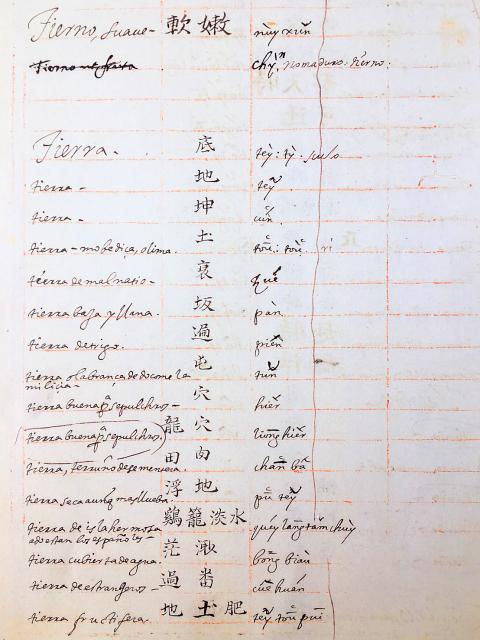A research team composed of Taiwanese and Spanish researchers yesterday discovered a lexicon that provides important clues about the development of Hoklo (commonly known as Taiwanese) in Taiwan during the 17th century.
The researchers said the 1,000-page lexicon titled The Vocabulary of the Language of Changchou (漳州話詞彙) contains 20,000 entries of words in use at the time of the Spanish occupation of Taiwan in 1620.
Researchers discovered the text while conducting research at the University of San Tomas in Manila.

Photo: Yang Chin-chieh, Taipei Times
Academia Sinica assistant researcher Chen Tsung-jen (陳宗仁) said the government’s “new southbound policy” is not a new idea, citing the travels of Hoklo speakers from southern Fujian Province to what is now the Philippines and Indonesia more than 400 years ago.
Chen said the text gives insight into what those Hoklo speakers encountered on their travels, adding that the text also provides evidence that the development of Hoklo stabilized at around that period in history, as it contains many expressions that are still in use.
“Hoklo has more than 1,000 years of history, having been in use since just after the Song dynasties. It is a shame to call it simply a ‘dialect.’ It has speakers in the Philippines, China, Malaysia and Singapore, and provides an important link with Southeast Asia,” Chen said.
National Tsing Hua University Department of History associate professor Lee Yu-chung (李毓中) said the text could also explain commonly misunderstood Hoklo terms.
The definitions are written using a combination of romanized Hoklo, romanized Mandarin, Chinese characters and Spanish, Lee said, adding that one-third of the definitions include annotations written using the official local language of the time.
“These annotations will really help with understanding the overall content,” Lee said.
Some expressions found in the text such as “washing one’s front door’s lintel” (se bun hong, 洗門風), meaning to publicly shame oneself out of regret over damaging another person’s honor, and the Hoklo term for “tears” (bak sai, 目虱) are still in use today, while other expressions found in the text are defined slightly differently from modern usage, Chen said.
The text also provides evidence about Spanish perceptions of the island, citing references to Keelung and Tamsui as “Spanish territory on Isla Hermosa,” he added.
“In the future when films are made about The Kingdom of Tungning, we will know how to portray certain behaviors and how to write dialogue for those cursing at others,” Chen said, adding that it also helps with understanding differences in Hoklo between Taiwan and Southeast Asia.
The team, which includes researchers from Academia Sinica, National Tsing Hua University, Spain’s University of Seville and Pompeu Fabra University in Barcelona, said the text represents the most comprehensive material discovered so far on 16th and 17th-century Hoklo vocabulary.

A preclearance service to facilitate entry for people traveling to select airports in Japan would be available from Thursday next week to Feb. 25 at Taiwan Taoyuan International Airport, Taoyuan International Airport Corp (TIAC) said on Tuesday. The service was first made available to Taiwanese travelers throughout the winter vacation of 2024 and during the Lunar New Year holiday. In addition to flights to the Japanese cities of Hakodate, Asahikawa, Akita, Sendai, Niigata, Okayama, Takamatsu, Kumamoto and Kagoshima, the service would be available to travelers to Kobe and Oita. The service can be accessed by passengers of 15 flight routes operated by

GIVE AND TAKE: Blood demand continues to rise each year, while fewer young donors are available due to the nation’s falling birthrate, a doctor said Blood donors can redeem points earned from donations to obtain limited edition Formosan black bear travel mugs, the Kaohsiung Blood Center said yesterday, as it announced a goal of stocking 20,000 units of blood prior to the Lunar New Year. The last month of the lunar year is National Blood Donation Month, when local centers seek to stockpile blood for use during the Lunar New Year holiday. The blood demand in southern Taiwan — including Tainan and Kaohsiung, as well as Chiayi, Pingtung, Penghu and Taitung counties — is about 2,000 units per day, the center said. The donation campaign aims to boost

ENHANCING EFFICIENCY: The apron can accommodate 16 airplanes overnight at Taoyuan airport while work on the third runway continues, the transport minister said A new temporary overnight parking apron at Taiwan Taoyuan International Airport is to start operating on Friday next week to boost operational efficiency while the third runway is being constructed, the Ministry of Transportation and Communications said yesterday. The apron — one of the crucial projects in the construction of the third runway — can accommodate 16 aircraft overnight at the nation’s largest international airport, Minister of Transportation and Communications Chen Shih-kai (陳世凱) told reporters while inspecting the new facility yesterday morning. Aside from providing the airport operator with greater flexibility in aircraft parking during the third runway construction,

American climber Alex Honnold is to attempt a free climb of Taipei 101 today at 9am, with traffic closures around the skyscraper. To accommodate the climb attempt and filming, the Taipei Department of Transportation said traffic controls would be enforced around the Taipei 101 area. If weather conditions delay the climb, the restrictions would be pushed back to tomorrow. Traffic controls would be in place today from 7am to 11am around the Taipei 101 area, the department said. Songzhi Road would be fully closed in both directions between Songlian Road and Xinyi Road Sec 5, it said, adding that bidirectional traffic controls would